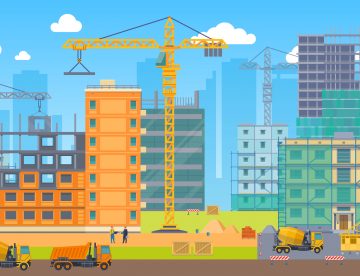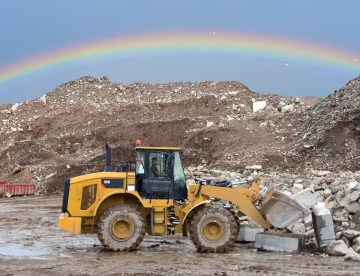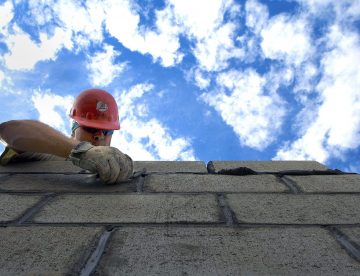
Statistics from the Health and Safety Executive show that there has been an average of 61,000 non-fatal injuries in construction each year and that during the period 2020-21 there were 39 fatal injuries. Although that might not seem a large number, it’s 4 times the rate for all industries!
Whilst falls from height and slips, trips and falls feature among the most common causes of injury, every year thousands of people are injured due to hazards arising from the equipment they’re using on site. Take a look at this week’s blog for six common dangers to watch out for.

The world we live in is constantly changing and the construction industry is certainly no exception to this. While some of the changes construction faces are incredibly challenging (for instance, the materials and labour shortages that have been widely reported in recent years) others can be seen as game-changing opportunities to boost productivity, conquer new markets, improve sustainability and support the wellbeing of the workforce.
As we start another year, still in the grips of the global pandemic along with other serious planetary concerns, we’re taking a look at some of the predicted top trends for construction in 2022.

Globally, in every town and every city, concrete is used to give our buildings shape and strength. But the huge scale of the concrete industry comes at a cost – it’s estimated that around 7% of the world’s carbon dioxide emissions come from the manufacture and use of cement, which is the main component of concrete.
Now, a team from the University of Tokyo have come up with a new kind of concrete that has the potential to reduce emissions from the construction industry! Read on to find out more about this concrete of the future.

This week, the UN Climate Change Conference known as COP26 opened in Glasgow, bringing representatives from around 200 countries into the Scottish city.
With so much ground to cover, the conference is due to last two weeks, closing on 12th November. One pledge that’s already been made by leaders of more than 100 countries is a commitment to end deforestation by 2030. As the days progress, no doubt we’ll see more headline pledges like this but meanwhile, we thought it might be helpful to summarise what COP26 is all about and what it potentially means for construction. Read on for your five-point guide.

Between July and September this year, the number of vacancies in construction soared to around 43,000 *. That’s double the amount of unfilled jobs the sector saw this time last year and the highest level ever recorded in the 20 years since the data was first collected back in 2001!
While this (alongside other issues like the rising costs of materials) might seem to be cause for concern as we head into the winter, some industry and recruitment experts believe things may be about to change. Find out more, including news of current vacancies at Sheriff, in this week’s blog.

With the news headlines moving slightly away from the coronavirus pandemic into an almost daily dose of woe about the energy market crisis, in today’s blog we’re looking at what effect this might have on construction.
While Sheriff Construction and other building contractors like us do not use very much natural gas in our day-to-day work, the problem is that our suppliers do. Manufacturing the materials we use is often energy intensive and, with the hike in the price of gas, it’s inevitable that those costs will start to pass through the procurement process. One leading economist is warning the industry to be prepared for a ‘phase of rising prices’ in bricks, cement and concrete. Read on for more information.

For any company to be successful, good leadership is essential. This is true across many different industries and the main issue for construction businesses is achieving this at all the various leadership levels across their organisation. Among other things, we need great leaders in the office to provide direction on the business strategy, principles and procedures; we need great leaders on board at the very beginning of every project to engage with clients and oversee safety, costs and budgeting; and we need great leaders on the ground at each site to manage schedules, monitor progress and motivate the team. With so much riding on it, we’re taking a moment this week to reflect on what good leadership in construction actually looks like.

While strict health and safety measures have certainly reduced the number of injuries and fatalities in construction, the industry is still one of the most hazardous in the UK. Last year, construction workers suffered 61,000 non-fatal injuries and 40 people died as a result of workplace injury in our sector. What’s most frustrating is that the vast majority of on-site injuries are completely preventable. Today, we’re taking a look at four of the most common causes of accidents and offering some basic tips on what you can do to reduce the risks.

In a week that’s been a bit shaky for the UK government, you might have missed the moment when Business Secretary, Alok Sharma thanked the construction sector for facing the challenges of remaining open, supporting the economy and carrying out vital work throughout the pandemic. In an open letter to all involved in the industry,…

Second only to packaging in generating an estimated 50,000 tonnes of plastic waste each year, it’s clear that plastic is still a big problem for the UK’s construction sector. Of course, it’s the very thing that makes plastic desirable (it’s durability) which is what also causes the biggest issues. With so much plastic waste ending…
